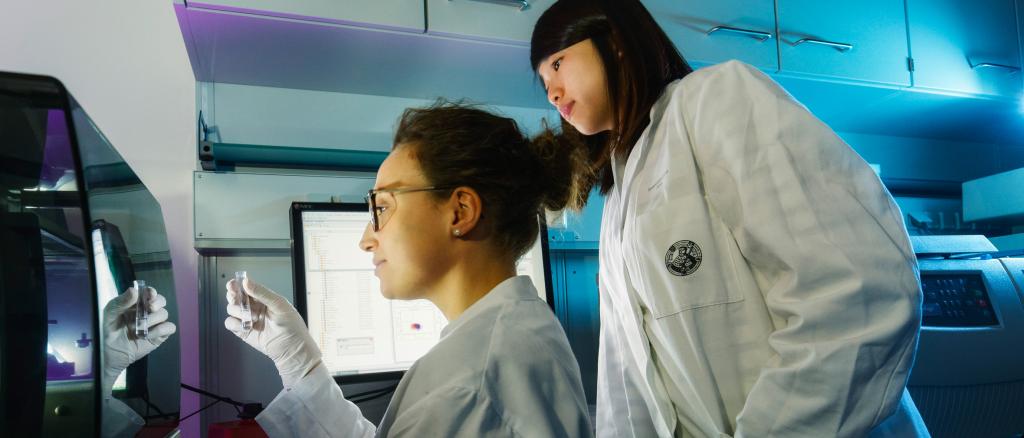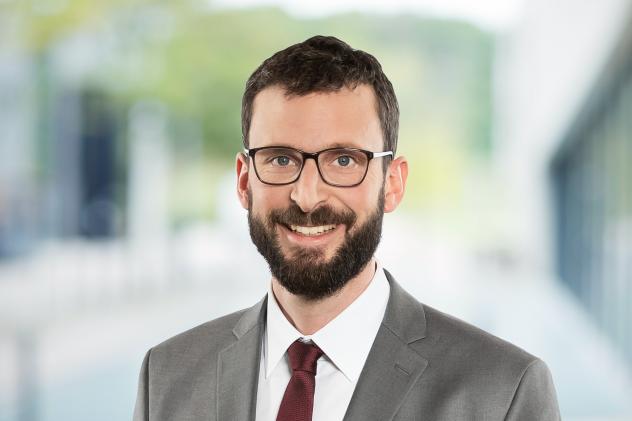
An overview of the projects funded from the funding line “Else Kröner Graduate Schools” can be found here.
The Else Kröner Graduate Schools for Medical Students offer the scholars the opportunity to focus entirely on their thesis for at least one year in a scientifically promising research project – embedded in an inspirational environment with experienced and committed supervisors.
In order to participate, both the supervisors and the scholars must qualify in a careful selection process. The major objective: To achieve results within the scope of the doctoral thesis, which meets with international and scientific response in the form of a lead author paper.
The maximum funding volume per doctoral study programme and location amounts to €900,000 for three years, with the option of a second period.
Please also note our current call for proposal.
Submitting the Paper of the Month:
We invite all project managers, fellowship recipients and members of graduate study programs to submit their publications that have emerged from funding as Paper of the Month. You can find more information here. You can find an overview of the Paper of the Month here.
2023
The following three Else Kröner Graduate Schools for Medical Students in Jena, Mainz and Regensburg will each receive funding of 900,000 euros.
AURA: Autophagy – Recycling, Repair, Defense (Jena University Hospital)
Autophagy is an intracellular process in which misfolded proteins or damaged cell organelles are degraded and their component parts recycled. This process takes place in all of the body’s cells in the sense of permanent cell repair, and is greatly intensified when certain situations occur. In the case of many diseases, including cancer along with cardiovascular, neurodegenerative, metabolic and other disorders, this autophagy is impaired. In the course of the doctoral program students pursuing a degree in medicine are introduced to the subject of autophagy within the scope of a structured qualification program and work on doctoral projects which deal with the mechanisms of autophagy and regulation thereof, as well as the consequences of impaired autophagy. This way doctoral candidates are made familiar with experimental medical research and motivated to contribute towards boosting clinically oriented autophagy research. In the long term, this equally entails aspiring towards academic careers in university hospital medicine.
Applicants: Prof. Dr. Christian A. Hübner, lead spokesperson, is Director of the Institute of Human Genetics and Vice-Dean of Research. Deputy spokesperson is Prof. Dr. Regine Heller, Group Leader at the Institute of Molecular Cell Biology and Vice-Dean of Promotion of Young Researchers in Jena.
Here you can find further information.
ImmunYoAge: The Immune System – Young versus Aged (University Medical Center Mainz)
Certain illnesses present themselves differently from a clinical viewpoint, depending on whether they occur in young people or the elderly. This particularly applies for diseases afflicting the immune system, for example certain rheumatic diseases or atopic dermatitis (skin conditions), yet the same is true of leukemia in juveniles and adults. The aim of this doctoral program is to map out molecular determinants for the age specificity of immune-mediated diseases. They are intended to help gain a better understanding of the causes for the different courses diseases take and build upon this to develop new therapies. In the program one doctoral candidate in medicine and one in natural sciences will work jointly on one project. Fundamental knowledge in natural sciences and methodological expertise will be contributed by scientists, the clinical issue in question and access to specimen material from patients via medical professionals.
Applicants: Prof. Dr. Julia Weinmann-Menke, lead spokesperson, is Head of the Dept. of General Nephrology and Kidney Transplantation and Academic Director of the Mainz Research School of Translational Biomedicine (TransMed). The deputy spokespersons are Prof. Dr. Stephan Grabbe, Director of the Dept. of Dermatology, Polyclinic and Research Center for Immunotherapy, and Prof. Dr. Klaus Lieb, Director of the Dept. of Psychiatry and Psychotherapy, and Scientific Director of the Leibniz Institute for Resilience Research.
Here you can find further information.
TALENT: Dysfunctional ion homeostasis – Superordinated analogies of different cell types and diseases (University Hospital Regensburg)
Variations of intracellular Na+ und Ca2+ metabolism play a decisive role in the case of numerous diseases, for instance of the lung, the kidney, the immune system and the heart. Since these ionic dysregulations frequently have similar mechanisms as the underlying causes, it is sensible to research these variations not solely on an organ-specific basis but on an interdisciplinary level as well. The focus of the research projects within the scope of the program lies on the identification of potential analogies and similar signaling pathways for different organ systems. In joint cooperation with the Faculty for Biology and Preclinical Medicine it is intended that an innovative doctoral program comes into being that addresses students pursuing a degree in medicine early on – readily in the course of the preclinical stage of studies – and subsequently prepares them for scientific work.
Applicants: Prof. Dr. Stefan Wagner, lead spokesperson, is Professor for Translational Cardiology and Senior Physician at the Dept. for Internal Medicine II of University Hospital Regensburg. Deputy spokesperson is Prof. Dr. Frank Schweda, holder of the Chair for Physiology II and Managing Director of the Institute for Physiology at the University of Regensburg.
Here you can find further information.
Class of 2020
Following a two-stage selection process, in this year’s call for proposals the following three locations were chosen, each of which initially receives funding in the amount of EUR 900,000 for three years.
Funding Research on Inflammation
Besides infectious pathogens, a broad spectrum of non-infectious causes for inflammatory reactions exists as well. The graduate study program “FöFoLe-Inflammation” makes this the starting point and is going to strengthen the outstanding research on inflammation on the LMU campus in the case of infectious and non-infectious diseases. The opportunity to take part in “FöFoLe-Inflammation” is provided to project managers in many specialized areas and to students with very different clinical interests. The graduate study program also offers a training program based on educational research and includes inter alia activities toward the further development of students’ personalities in becoming researching physicians.
Proposers: Spokesman Prof. Dr. Hans-Joachim Anders is head of nephrology at “Klinikum Innenstadt”, the inner-city clinic location at LMU. Envisaged as deputy spokespersons are Prof. Dr. Barbara Schraml (Walter Brendel Centre of Experimental Medicine), Prof. Dr. med. Thomas Gudermann (Walter Straub Institute of Pharmacology and Toxicology), and Prof. Dr. med. Veit Hornung (Immunobiochemistry, Gene Center at LMU).
Here you can find further information.
Digital Transformation in Medicine (DigiStrucMed)
Digital transformation makes it necessary to address issues which arise due to digitalization in diagnostics and therapy. This applies to to medical training and research as well. With DigiStrucMed, an innovative structure involving collaboration between medicine and computer science is going to come about on the part of MHH and its cooperation partners from the informatics departments at the Technical University Braunschweig and Leibniz University Hannover. Research issues close to clinical practice will be worked on jointly by medical students in the course of getting their medical degree and by informatics students in the course of getting their master’s degree. In the process the fellows profit from a training program which, alongside general competencies, primarily depicts subject matter dealing with digitalization.
Proposers: Spokesman Prof. Dr. Michael Heuser is senior physician at the Clinic for Hematology, Hemostaseology, Oncology and Stem Cell Transplantation at MHH. Deputy spokespersons are Prof. Dr. Dr. Michael Marschollek (Peter L. Reichertz Institute for Medical Informatics at TU Braunschweig and MHH) and Prof. Dr. Felicitas Thol, (Hematology, Hemostaseology, Oncology and Stem Cell Transplantation, MHH).
Here you can find further information.
Rethinking Health: Healthcare and Prevention Research
The Else Kröner graduate study program “Rethinking Health” is going to close the crucial gap between studying for a medical degree and academic careers, and introduces medical students to a substantial scientific activity at an early stage. Accordingly, the graduate study program provides a hook-up at the location to the BIH Charité Clinician Scientist Program, which has been readily established for years at Charité and the Berlin Institute of Health (BIH). Embedded into the “Strategy Charité 2030”, the graduate study program endeavors to attain a new scientific understanding of the condition “health” as an active process driven by mechanisms belonging to continuous adaptation to the environment (microbiome, nutrition, etc.). A better understanding of such health-preserving signaling networks that increase fitness and disease resilience in a species is intended to lead to the identification of molecular target structures for prevention. Additionally, there is a mentoring program for female physicians aimed at raising the number of female physicians appointed to professorships to an above-average level in the coming years.
Proposers: Spokesman Prof. Dr. Andreas Diefenbach is director of the Institute of Microbiology, Infectious Diseases and Immunology at Charité. Envisaged as deputy spokespersons are Prof. Dr. Chiara Romagnani (DRFZ German Rheumatism Research Center and Department of Gastroenterology, Infectiology and Rheumatology) and Prof. Dr. Felix Knauf (Department of Nephrology and Medical Intensive Care).
Here you can find further information.
Class of 2017 (Extension 2021)
Four Else Kröner graduate study programs at the locations Göttingen, Hamburg, Heidelberg and Jena were approved in 2017. At the end of the initial three-year funding period, in accordance with the call for proposals the four graduate study programs had the opportunity to apply for a second funding phase for another three years.
University Medical Center Göttingen
Spokesman: Prof. Dr. Matthias Dobbelstein
The Else Kröner graduate study program “Genome Dynamics and Epigenomics” promotes high-achieving medical students with an interest in biomedical research. The program supports them in their intention to accomplish a demanding doctoral thesis in experimental medicine parallel to their studies. This is made possible via networking events, course offers and fellowships for sabbatical semesters to carry out research.
You can find more information here.
University Hospital Hamburg-Eppendorf
Spokesman: Prof. Dr. Tobias B. Huber
An innovative doctoral sponsorship in the field of translational inflammation research has been brought to life with the Else Kröner graduate study program iPRIME. Interdisciplinary projects from the areas of organ-specific and organ-transcending immune response in the kidney, liver, CNS, intestine and maternal-fetal medicine are worked on using the latest technologies and resolved all the way to the single-cell level.
You can find more information here.
Heidelberg University Hospital
Spokesman: Extracurricular Prof. Dr. Volker Winkler
The “Heidelberg Graduate School of Global Health” is the first of its kind regarding the subject of global health in Germany and consequently breaking key new ground. In this graduate study program doctoral candidates are trained and receive advanced training to meet the growing demand for global health researchers. To accomplish this a demanding, internationally competitive curriculum has been developed which, among other facets, directly strengthens field research, too.
You can find more information here.
Jena University Hospital
Spokesman: Prof. Dr. Otto Witte
The “Jena School for Ageing Medicine” (JSAM) prepares young physicians for demanding clinical- scientific activity in geriatric medicine. Targets for interventional strategies are studied in the projects, strategies that counteract old-age-related dysfunctions in the realm of cellular and systemic function within different organ systems (e.g. brain, blood, blood vessels, muscle and liver).
You can find more information here.
Class of 2014
University Hospital Bonn
Spokesman: Prof. Dr. Albert Becker
You can find the project presentation here.
More information at https://www.bonnni.de/
MHH Hannover Medical School
Spokespersons: Prof. Dr. Karin Weissenborn and Prof. Dr. Markus Cornberg
You can find the project presentation here.
More information at https://www.klinstrucmed.de
Technical University of Munich
Spokesman: Prof. Dr. Dirk Busch
More information at http://www.mgc.med.tum.de
Class of 2014
Dresden University of Technology
Spokesman: Prof. Dr. Andreas Deußen
More information at https://tu-dresden.de/med/mf/cpk
University of Duisburg-Essen
Spokeswoman: Prof. Dr. Ursula Rauen
More information at https://www.uni-due.de/med/elan/index
Albert Ludwigs University of Freiburg
Spokespersons: Prof. Dr. Heike Pahl and Prof. Dr. Robert Thimme
More information at https://www.med.uni-freiburg.de/de/verwaltung/akademische-angelegenheiten/promotionen/moti-vate/moti-vate
